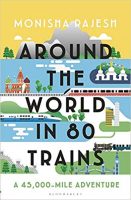Around the World in 80 Trains
by Monisha Rajesh
Bloomsbury (£20)
 In the age of high-speed rail, with a wooomph! on the tracks and a blur through the windows, you might think there’s little to savour and less to say about long-distance train travel. You’d be wrong: as Monisha Rajesh triumphantly demonstrates in Around The World in 80 Trains, there’s life yet in both the trip and the telling.
In the age of high-speed rail, with a wooomph! on the tracks and a blur through the windows, you might think there’s little to savour and less to say about long-distance train travel. You’d be wrong: as Monisha Rajesh triumphantly demonstrates in Around The World in 80 Trains, there’s life yet in both the trip and the telling.
Rajesh, born in Norfolk in 1982, the daughter of two Indian doctors whose training sent them all over England, was perhaps fated to be a traveller. For her debut, Around India in 80 Trains (2012), a journey she finished alone after falling out with her companion, she endured harassment that’s inadequately described on the sub-continent as “Eve-teasing”. For her follow-up — a seven-month, 45,000-mile trip through Europe, Russia, Asia and North America during which she reported for Telegraph Travel — she has the company of her fiancé (now husband), Jem, shouldering his first rucksack, and, towards the end, of a photographer friend, Marc (whose images appear in the book).
Safer? Not always. While she’s with Jem on a commuter service outside Moscow, two men spit at her legs; on the Trans-Mongolian, while Jem is elsewhere, the provodnik (guard) rescues her from a groper. Then there’s an additional danger for a writer: that travelling in company means travelling in a bubble. One of her predecessors on the long-distance train, Paul Theroux, has said firmly (in The Old Patagonian Express) that “to see, to examine, to assess, you have to be alone and unencumbered”. Not necessarily. You just leave the fiancé buried in a book, and seize every opportunity to chat up passengers, staff and locals.
In slack-packer Thailand, Rajesh says she and Jem would be as lazy as the rest if it weren’t for a schedule, dictated by timetables and rail passes, that “pivoted on punctuality”. She doesn’t mean it: though she wouldn’t bridle at being labelled a tourist, she’s travelling for work, and she takes it seriously. She makes good use of a Dictaphone; en route to Kazakhstan, she finds online a student in Almaty with a smattering of English.
Two of her most powerful passages are from Thailand and Japan: the first on the Burma-Siam Railway — better known now as “the Death Railway” because it was built by prisoners of war and Asian labourers at the orders of the Japanese — and the second on Hiroshima, a few of whose residents survived the immediate after-effects of the atomic bomb of August 1945 by fleeing on trains. In each case, she arrives well-briefed.
Before leaving London, she had interviewed Sir Harold Atcherley, a surviving PoW (he has since died) who had recently played host to one of his old foes because “you can’t go on hating people”. Atcherley told her that “equal proportions of good, indifferent and lousy people exist in any group, any country”. In Hiroshima, she times her arrival for memorial services marking the 70th anniversary of the dropping of the bomb, and seeks out 81-year-old Tetsushi Yonezawa, who tells her: “If I had stayed in Hiroshima, I would have died. These trains saved my life.”
Trains are life-affirming too. In Thailand, Rajesh swaps food with a Dutch family, and the mother tells her: “We have a word in Dutch, gezellig, which means that there are no boundaries and that everyone is sharing and getting along with everyone else… like we are a train family.” Gezellig resounds through the following pages.
With a few exceptions — including the trains of Canada, where retired couples are so sick of each other that they sit in separate carriages — Rajesh and Jem are enfolded in a family of the rails. Rajesh, having been “regularly branded a pretender by both my country of birth and my country of origin”, feels entirely at home. In Nanning, a Chinese passenger walks across town with his new British friends to help them find the agency selling their onward tickets to Hanoi, and then back with them to the station to point them to the right platform. Another man met on a train not only finds them a room in a hotel near a station but pays for it.
Rajesh’s prose occasionally lacks polish; a sentence veers into brochurese (“this journey oozed energy”) or completely off the rails (“Booked up by a travel agent for more than 200 days the following year, it was no wonder that a naughty smile…”). But then there are a few rattles on all the best trains. MK
This review appeared in The Daily Telegraph on January 26, 2019
